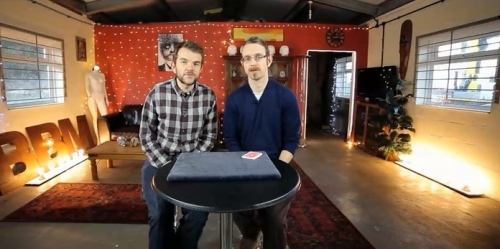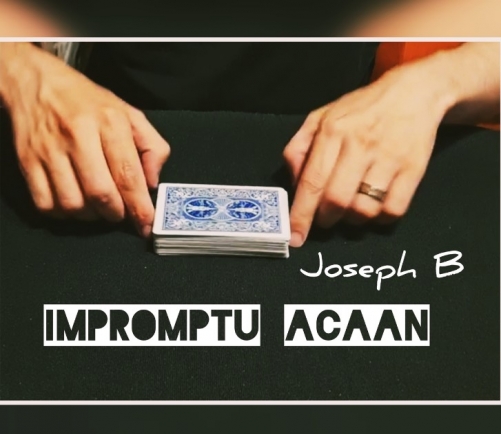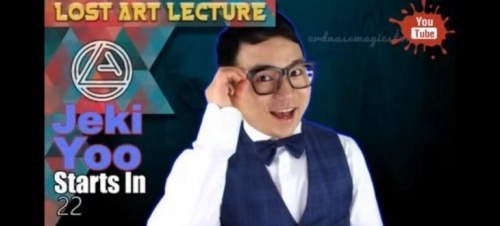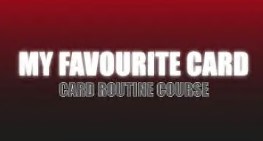Your position: Home / New arrival
The Quasi-Memorized Alphabet Deck by Stephen Faraone
Get much of the power of a memorized deck with no memorization
If you can spend 15 minutes to learn my core method, you can unlock some benefits of a memorized deck without using mnemonics or marked cards. Here are seven of the 23 effects:
1. A spectator freely cuts the deck to any card. As they visualize the letter in their mind, you read their mind and reveal what letter they selected.
2. While your back is turned, a spectator cuts the deck and deals cards face up until three successive cards spell a valid English word. They fix that word in their mind and you proceed to read their mind and reveal the word.
3. The spectator selects any letter from the deck. It is a free selection. You divine the letter by asking questions to successive cards in the deck.
4. You guide your spectator through a process of free association that leads them to make choices that you predicted in advance.
5. Using the psychological constructs of “stream of consciousness” and “thought connections” you and your spectator each select three cards. After some shuffling and cutting, each of the cards you selected has located one of the spectator’s selected cards, showing that you have a “thought connection”. For a finale, when you spread the cards, only four cards are face up and they are your initials and those of your spectator.
6. After a fair and messy shuffle of the deck (a real shuffle, not a false shuffle), you spread the two halves of the deck faces down in two rows. As you hover your hands over the spread, you detect letters that you sense are somehow relevant to the spectator. These letters are flipped over and show that you’ve made a meaningful mental connection with your spectator.
7. After shuffling, you deal out five hands of five cards each telling spectators that the goal of the game is to make as many four-letter words as possible from their cards. You, of course will be able to divine all the four-letter words they have found in their hands.
As with all memorized deck work, you need to know how to false shuffle and/or cut the deck but, otherwise, most effects are free of sleights. The effects include my favorite patter, much of which has psychological overtones because I am a psychologist who enjoys creating effects with cards.
You will get a 55 page pdf that contains the method along with 23 effects. No fluff, no lame jokes. Just method and effect and 75 footnotes, mostly to credit sources of inspiration. I use the alphabetic nature of the cards, not only to make memorization easy, but also to use letters to form initials, names or other words.
WARNING: You will NOT receive a deck of alphabet cards but I will point you to several options, listing their pros and cons. These range from inexpensive, homemade cards to commercial decks like Letter Perfect or the DMC Alphas. You will NOT receive a video. Most effects do not require any sleights. Those that do are beginner level.
Get much of the power of a memorized deck with no memorization
If you can spend 15 minutes to learn my core method, you can unlock some benefits of a memorized deck without using mnemonics or marked cards. Here are seven of the 23 effects:
1. A spectator freely cuts the deck to any card. As they visualize the letter in their mind, you read their mind and reveal what letter they selected.
2. While your back is turned, a spectator cuts the deck and deals cards face up until three successive cards spell a valid English word. They fix that word in their mind and you proceed to read their mind and reveal the word.
3. The spectator selects any letter from the deck. It is a free selection. You divine the letter by asking questions to successive cards in the deck.
4. You guide your spectator through a process of free association that leads them to make choices that you predicted in advance.
5. Using the psychological constructs of “stream of consciousness” and “thought connections” you and your spectator each select three cards. After some shuffling and cutting, each of the cards you selected has located one of the spectator’s selected cards, showing that you have a “thought connection”. For a finale, when you spread the cards, only four cards are face up and they are your initials and those of your spectator.
6. After a fair and messy shuffle of the deck (a real shuffle, not a false shuffle), you spread the two halves of the deck faces down in two rows. As you hover your hands over the spread, you detect letters that you sense are somehow relevant to the spectator. These letters are flipped over and show that you’ve made a meaningful mental connection with your spectator.
7. After shuffling, you deal out five hands of five cards each telling spectators that the goal of the game is to make as many four-letter words as possible from their cards. You, of course will be able to divine all the four-letter words they have found in their hands.
As with all memorized deck work, you need to know how to false shuffle and/or cut the deck but, otherwise, most effects are free of sleights. The effects include my favorite patter, much of which has psychological overtones because I am a psychologist who enjoys creating effects with cards.
You will get a 55 page pdf that contains the method along with 23 effects. No fluff, no lame jokes. Just method and effect and 75 footnotes, mostly to credit sources of inspiration. I use the alphabetic nature of the cards, not only to make memorization easy, but also to use letters to form initials, names or other words.
WARNING: You will NOT receive a deck of alphabet cards but I will point you to several options, listing their pros and cons. These range from inexpensive, homemade cards to commercial decks like Letter Perfect or the DMC Alphas. You will NOT receive a video. Most effects do not require any sleights. Those that do are beginner level.
 USD
USD



